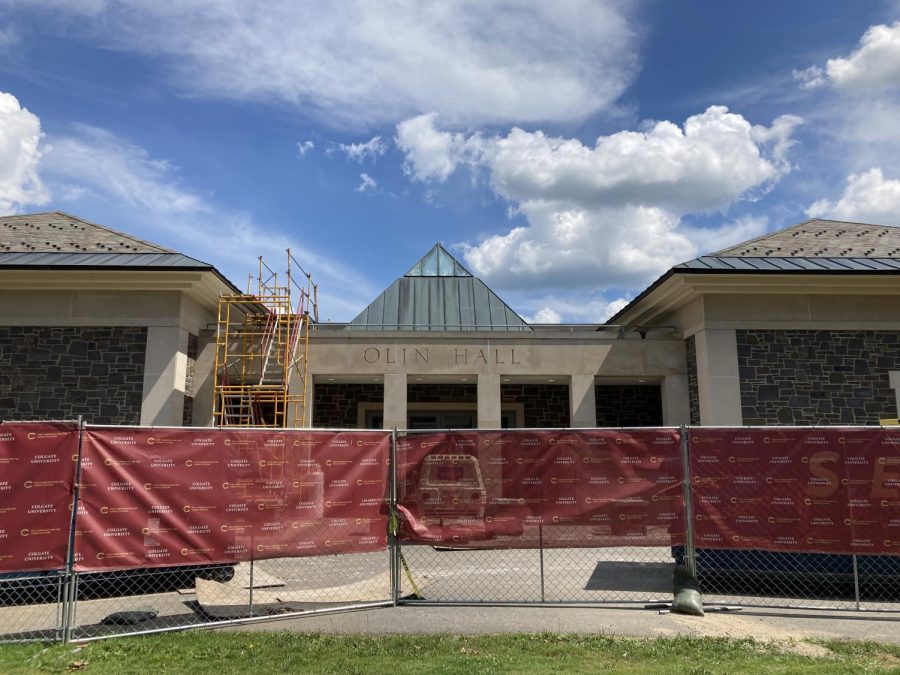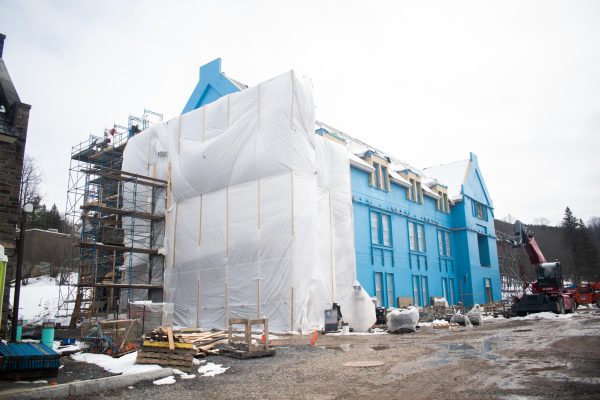Olin Construction Displaces Faculty, Staff, Students
Renovation equipment and a chain link fence obscures the main entrance to Olin Hall. Construction on the building will last until Aug. 2023.
The renovation of Olin Hall has displaced staff, faculty and students who formerly worked, did research or studied in the building.
As part of the University’s Third-Century Plan, the renovation aims to transform the building into a modern center of interdisciplinary scientific research and technology in what will be called the Robert Hung Ngai Ho Mind, Brain, and Behavior Initiative (MBBI) after the trustee emeritus whose $15 million donation enabled the project.
As renovation project manager Joe Inman wrote in an email to the student body on May 12, Olin Hall “will be closed to all faculty, staff, and students during the duration of the project.” Inman wrote that the renovation, which began on May 16, will be completed by Aug. 1, 2023.
Personnel who are typically located in Olin have been relocated around campus, according to Douglas Johnson, Associate Dean of Faculty for Curricular and Academic Affairs.
“Staff and faculty who usually work in Olin are now working from other spaces for the coming year (they are spread around campus, with many in the Ho Science Center),” Johnson wrote in an email to The Maroon-News.
Senior Kailey Paul —who spent the summer researching canine thermoregulation in Associate Professor of Biology Ana Jimenez’s lab — moved into a smaller lab space in Ho shared with two other professors and their student researchers, instead of her usual location in Olin Hall.
“It’s hard to move around and complete the needed tasks within the lab when other students and professors are completing their work in the same small space,” Paul said, adding that limited bench space can delay timelines, affecting the publishing of papers and the viability of time-sensitive research.
The lab where Paul now does her research also has a high proportion of researchers to equipment and materials, which she predicted having similarly negative implications. For example, Paul said there is only one desktop computer available in the lab, which she imagined causing conflicts about computer use. Related equipment issues are also a concern of hers.
“There will be a large amount of students using a small amount of equipment which could lead to the mixing up of samples or materials, rushed work or other mistakes,” Paul said.
Displaced staff, faculty and students are working together to seek out shared-space solutions, according to Johnson.
“Our colleagues throughout the campus have been generous in sharing office, lab and other spaces, as well as being willing to adjust teaching schedules to make use of class and lab times that allow courses that are usually taught in Olin to be taught in other locations,” he wrote, adding that it “really has been a generous and collaborative campus-wide effort.”
The renovations to Olin Hall are slated for completion by the end of Summer 2023. Despite the concessions Paul and her fellow researchers made, she said she is ultimately excited about the new opportunities for interdisciplinary innovation and “pushing the boundaries of science” that she expects the renovated Olin and MBBI to provide.
“As a researcher, I feel that the benefits that this improvement to Olin will provide should hopefully far eclipse any sacrifices that were incurred by the current research students,” Paul said, noting that, ultimately, “science works on developing advancements and knowledge for the benefit of the community as a whole.”

Sophie Karbstein is a sophomore from Jupiter, FL concentrating in Russian and peace and conflict studies. She has previously served as a staff writer for...

Josie Rozzelle is a senior from San Francisco, CA concentrating in political science with a minor in French. She has previously served as multimedia manager,...










Bri Liddell • Aug 28, 2022 at 6:51 pm
That’s my LINKSTER!!!! This is such a wonderful and informative article! In the span of just a few hundred words, your article has taught me so much about one of the most crucial things happening on campus right now. I look forward to reading more from this promising young writer in the future! A+++! <3